Why should businesses prioritize a content marketing hub?
Unlock the power of a dedicated content marketing hub that drives business success.
A content marketing hub is a centralized online platform or website that serves as a comprehensive resource for valuable, relevant, and engaging content.
It acts as a hub or center where businesses can curate, create, organize, and distribute a variety of content formats, such as articles, blog posts, videos, infographics, podcasts, and more.
The primary goal of a content marketing hub is to attract and engage the target audience, provide them with valuable information, and build a strong brand presence.
Think of a content marketing hub as a one-stop destination for all things related to a brand's content strategy.
It is the go-to place where businesses showcase their expertise, industry knowledge, and thought leadership.
By consistently offering high-quality and informative content, businesses aim to establish themselves as trusted authorities in their respective fields.
A content marketing hub is not just a repository of content; it is strategically designed to support various stages of the customer journey.
It helps businesses generate awareness, nurture leads, educate prospects, and drive conversions.
The hub serves as a central point from which content is distributed across different channels, including social media, email marketing, and search engines, ensuring a cohesive and consistent brand experience.
Make Your Content Available Anywhere Anytime In Any Device
Key elements of a content marketing hub include a user-friendly interface, intuitive navigation, clear categorization of content, and features that encourage audience engagement, such as comments sections, social sharing buttons, and interactive tools.
The hub is often optimized for search engines, making it easier for users to discover the content and for the business to improve its visibility in search results.
Benefits of a content marketing hub:
A content marketing hub is a vital asset for businesses seeking to excel in today's digital landscape. It offers a centralized platform for creating, distributing, and engaging with valuable content, delivering benefits such as enhanced brand visibility, customer engagement, improved conversions, and thought leadership positioning. Let's explore these advantages in detail.
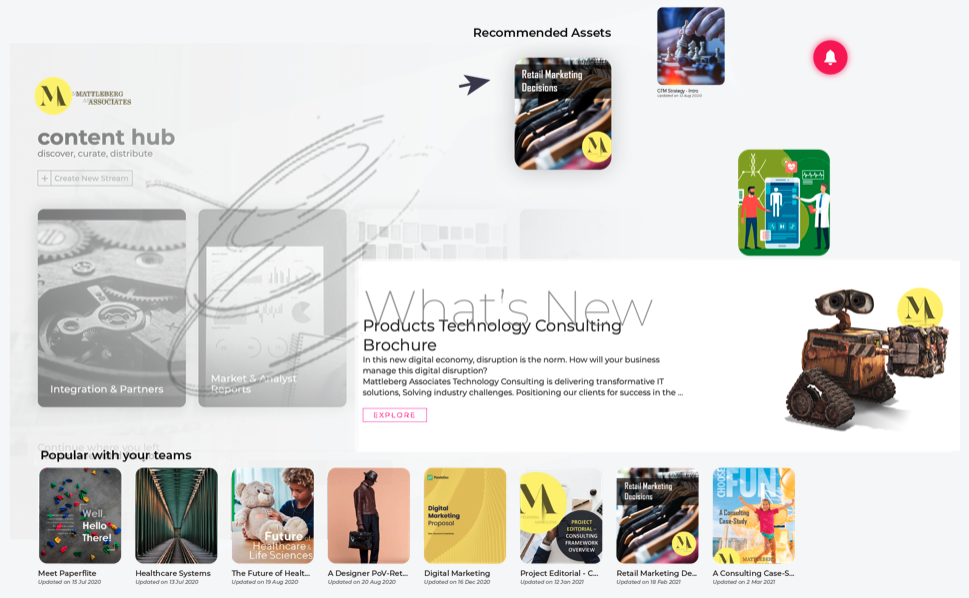
- Centralized Content Strategy: A content marketing hub allows businesses to streamline their content creation and distribution processes. By centralizing their efforts, organizations can eliminate content fragmentation, ensure brand consistency, and save time and resources.
- Enhanced Brand Awareness and Visibility: A content marketing hub provides a powerful platform for businesses to target a wider audience and establish thought leadership. By consistently producing valuable content, businesses can increase their brand's visibility, enhance search engine rankings, and attract new prospects.
- Increased Customer Engagement and Trust: One of the core advantages of a content marketing hub is its ability to build meaningful relationships with the audience. By providing valuable and relevant content, businesses can engage their target audience, address their needs and pain points, and foster trust and loyalty.
- Improved Conversion Rates and Sales: A well-designed content marketing hub guides prospects through the sales funnel by showcasing the benefits of products or services and demonstrating the organization's expertise. Compelling content educates, inspires, and persuades potential customers, leading to increased conversion rates and driving sales growth.
- Thought Leadership and Industry Authority: Through a content marketing hub, businesses can establish themselves as thought leaders in their respective industries. By consistently sharing valuable insights and expertise, they can gain credibility, attract a loyal following, and be recognized as trusted authorities.
- Targeted Audience Reach: A content marketing hub allows businesses to target specific audience segments with tailored content. By understanding the interests and preferences of their target audience, businesses can create interactive content that resonates, driving higher engagement and more meaningful interactions.
- Search Engine Optimization (SEO) Benefits: A well-optimized content marketing hub can improve search engine rankings, making it easier for potential customers to discover the business. By incorporating SEO strategies, such as keyword research, on-page optimization, and link building, businesses can increase organic traffic and visibility.
- Data-driven Insights and Refinement: A content marketing hub provides access to valuable data and analytics. By tracking key metrics and analyzing content performance, businesses can gain insights into audience behavior, content preferences, and engagement levels. This information enables them to refine their strategies and optimize content to achieve better results.
Leverage Intelligence On Every Stage Of Your Content Journey
- Long-term Value and Evergreen Content: A content marketing hub allows businesses to create evergreen content—content that remains relevant and valuable over time. Evergreen content provides long-term value, generating ongoing traffic, engagement, and conversions, even months or years after its initial publication.
- Competitive Advantage: A well-executed content marketing hub can provide a competitive advantage by differentiating a business from its competitors. By consistently delivering high-quality, valuable content, businesses can position themselves as industry leaders and stand out in a crowded marketplace.
Effective content marketing hub:
An effective content marketing hub is necessary to organize, centralize, and streamline content for efficient access, collaboration, and distribution. It ensures content is easily discoverable, personalized, and aligned with business goals, maximizing its impact, reducing duplication, and improving the overall effectiveness of the content.
Content storage Structure:
When it comes to creating an effective content marketing hub, it's essential to start by organizing your content. After gathering all the content, the first step is to define its structure. Depending on your organization's needs, you can categorize it into broader streams such as products, solutions, locations, or teams. This categorization helps create a logical framework for organizing and accessing content.
Uploading of the content:
Once you have structured your content, the next step is to upload it into the content marketing hub. Seamless and uncomplicated uploading is crucial to encourage frequent updates. When the process of uploading content is hassle-free, users are more likely to engage with the platform and contribute regularly. A user-friendly uploading feature ensures that adding content becomes a breeze.
Access to Content:
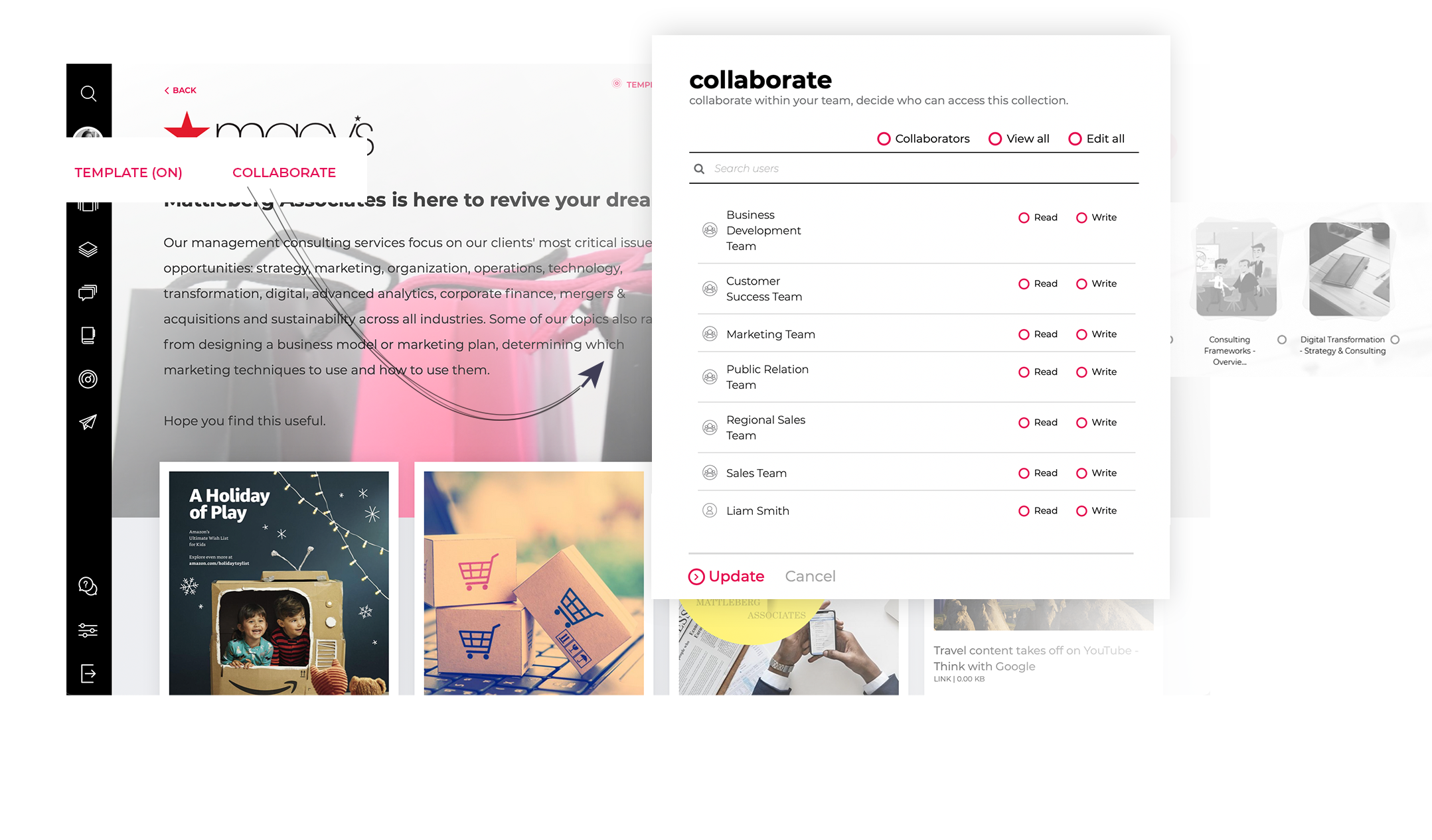
Not all content is meant for everyone. There may be confidential documents or specific content intended for particular teams. User access control allows you to restrict access to certain groups or individuals. By creating user groups and defining their access levels (such as edit, view, download, and share), you have control over who can access which content. This feature ensures that sensitive information remains restricted while enabling collaboration and knowledge sharing among relevant teams.
Integration to external tools:
In today's digital landscape, organizations rely on various tools and systems to streamline their operations. Integration plays a vital role in connecting the content marketing hub with other platforms such as CRM, CMS, marketing automation tools, and sales automation tools.
This integration allows for seamless data transfer and ensures a holistic view of information. By consolidating data from different sources, integration helps paint a complete picture and eliminates the need for manual data entry or switching between multiple tools.
Content Recommendation:
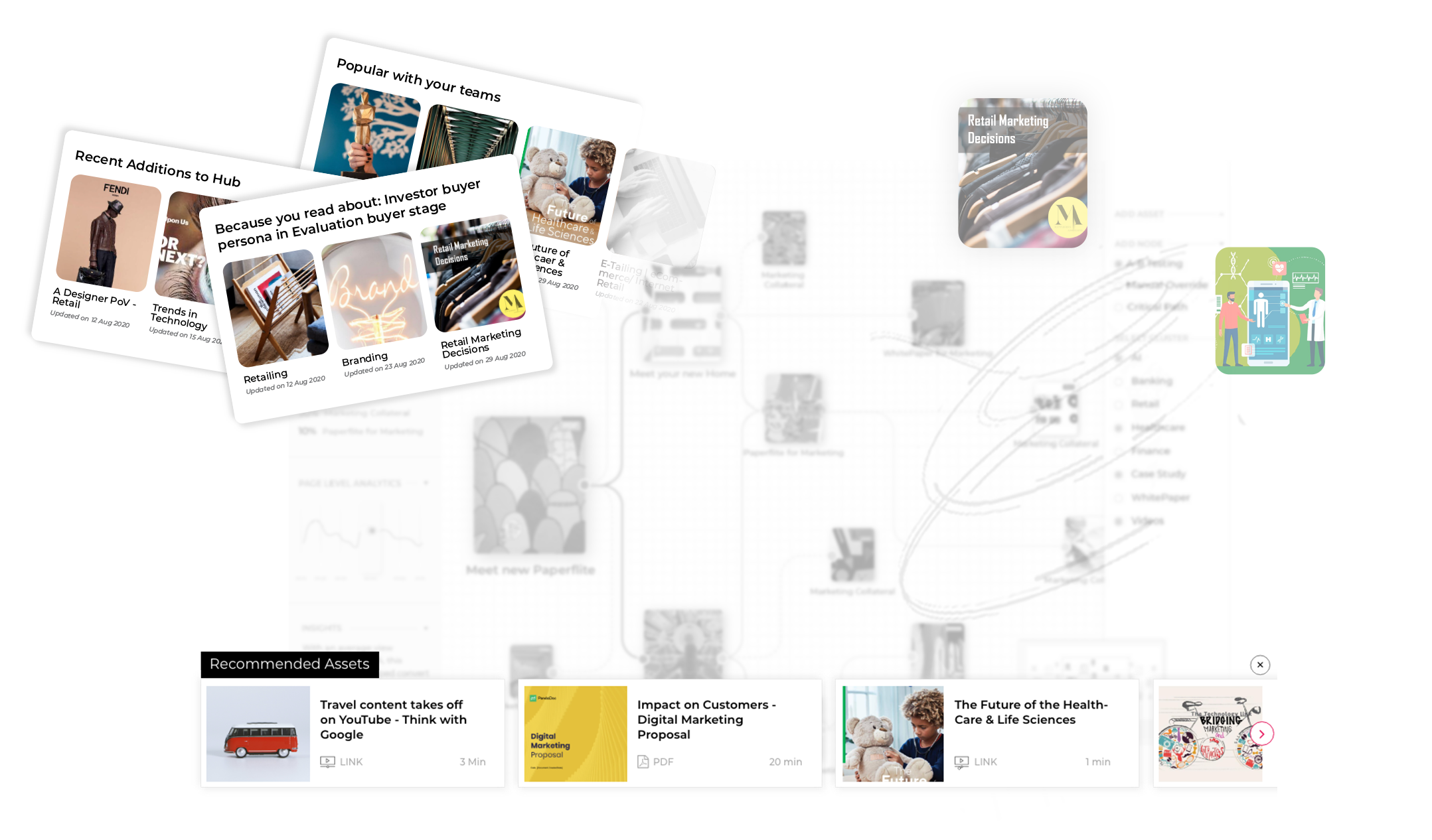
To enhance content consumption and engagement, consider implementing a content recommendation feature in your content marketing hub. This feature functions similarly to platforms like Netflix or YouTube, leveraging user behavior, preferences, and popular content among teammates to suggest relevant content. By offering personalized recommendations, users can discover content that aligns with their interests, encourages continuous learning, and minimizes distractions.
Promotion of the Content:
Creating valuable content is only half the battle; ensuring its visibility and accessibility is equally important. A promotional feature within the content marketing hub allows you to highlight specific content to relevant teams or individuals. Additionally, enabling notifications keeps users informed about new updates and activities within the platform, even when they are not actively using it. Promoting content and maintaining awareness ensure that valuable resources are effectively utilized by the sales team and other stakeholders.
Content Manager:
As your content library grows, having a comprehensive overview of all stored content becomes crucial. A content manager feature provides a centralized view of the entire content repository. This allows users to easily search for specific content without navigating through different divisions or categories. Additionally, it enables bulk changes to metadata, such as dates, custom fields, or keywords, streamlining content management and organization.
Search Capabilities:
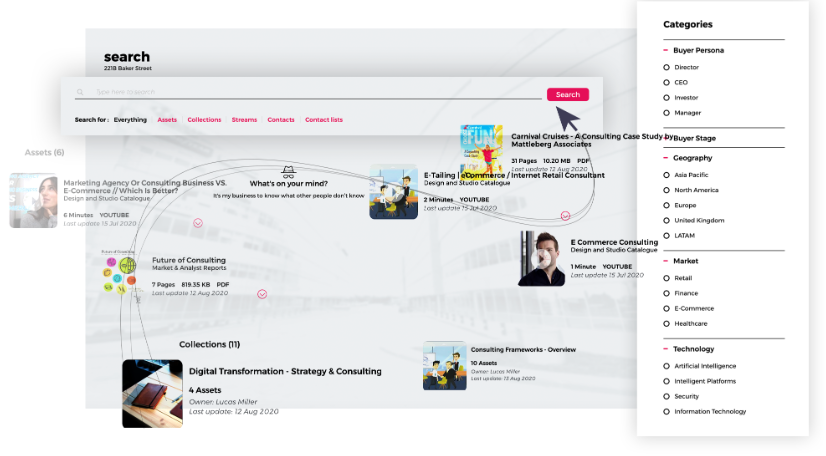
An impeccable search capability is essential for any content hub platform. With a vast amount of content available, sales reps often spend a significant amount of time searching for the right sales and marketing collateral. A content hub platform with advanced search capabilities considers intent, keywords, tags, descriptions, and categories to deliver accurate search results. By providing quick access to relevant assets, it saves time and boosts the efficiency of sales reps.
Bring The Netflix Experience To Your Sellers
Content Personalization:
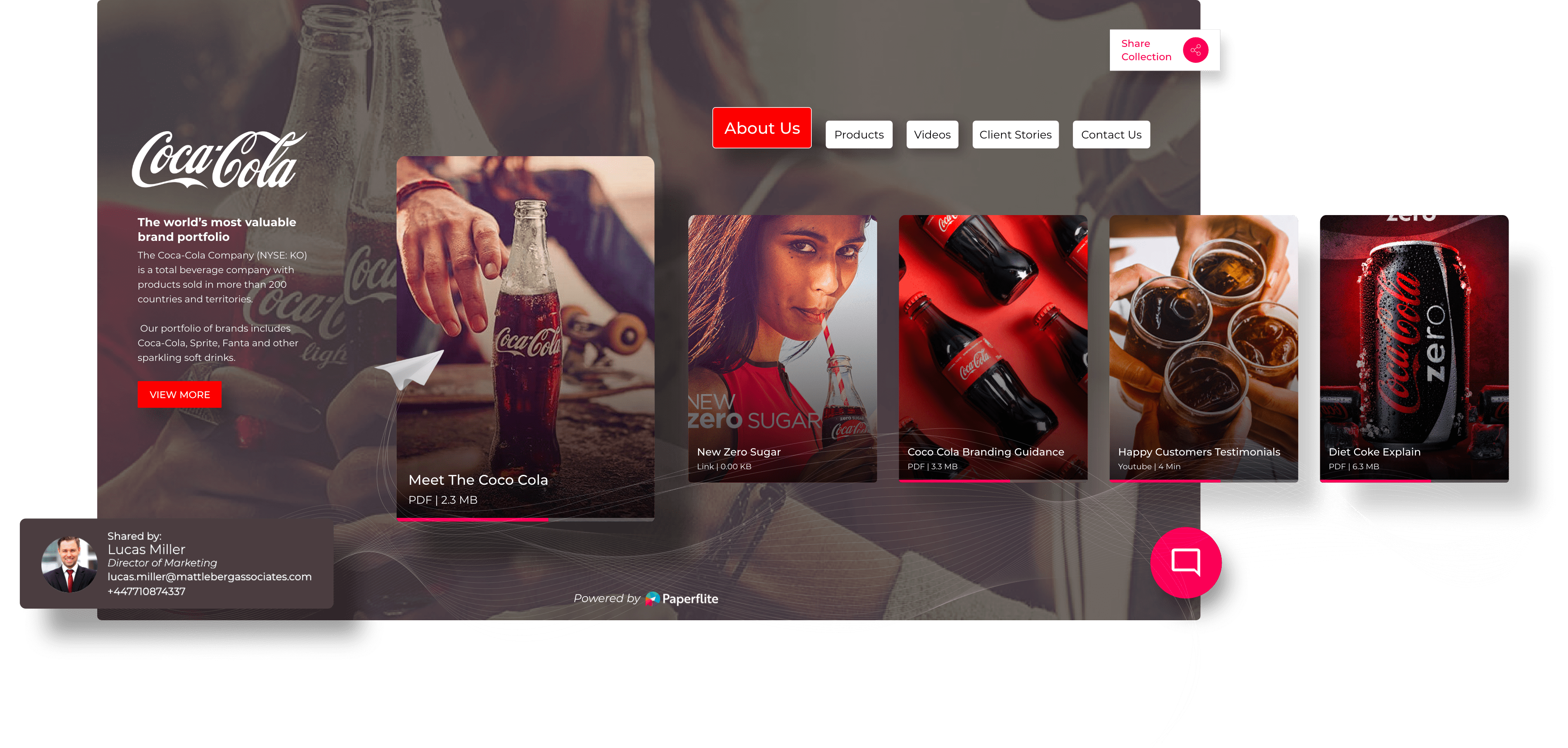
Personalization goes beyond sending customized content to prospects. It also includes creating highly personalized microsites that enhance the overall content experience. With a content marketing hub, you can curate content that is tailored to specific audiences, incorporating brand colors, logos, and personalized messages. Adding relevant, attractive visuals or interactive elements such as videos or images further enhances engagement and simplifies content consumption.
Adding Metadata:
A content marketing hub should offer an elaborate and flexible metadata feature. This allows you to enter all the necessary data that will help identify and classify content easily. Customizable fields should be available to capture specific information that is relevant to your team's needs. Having comprehensive metadata ensures efficient content organization and facilitates accurate search results.
Content Distribution and Analytics:
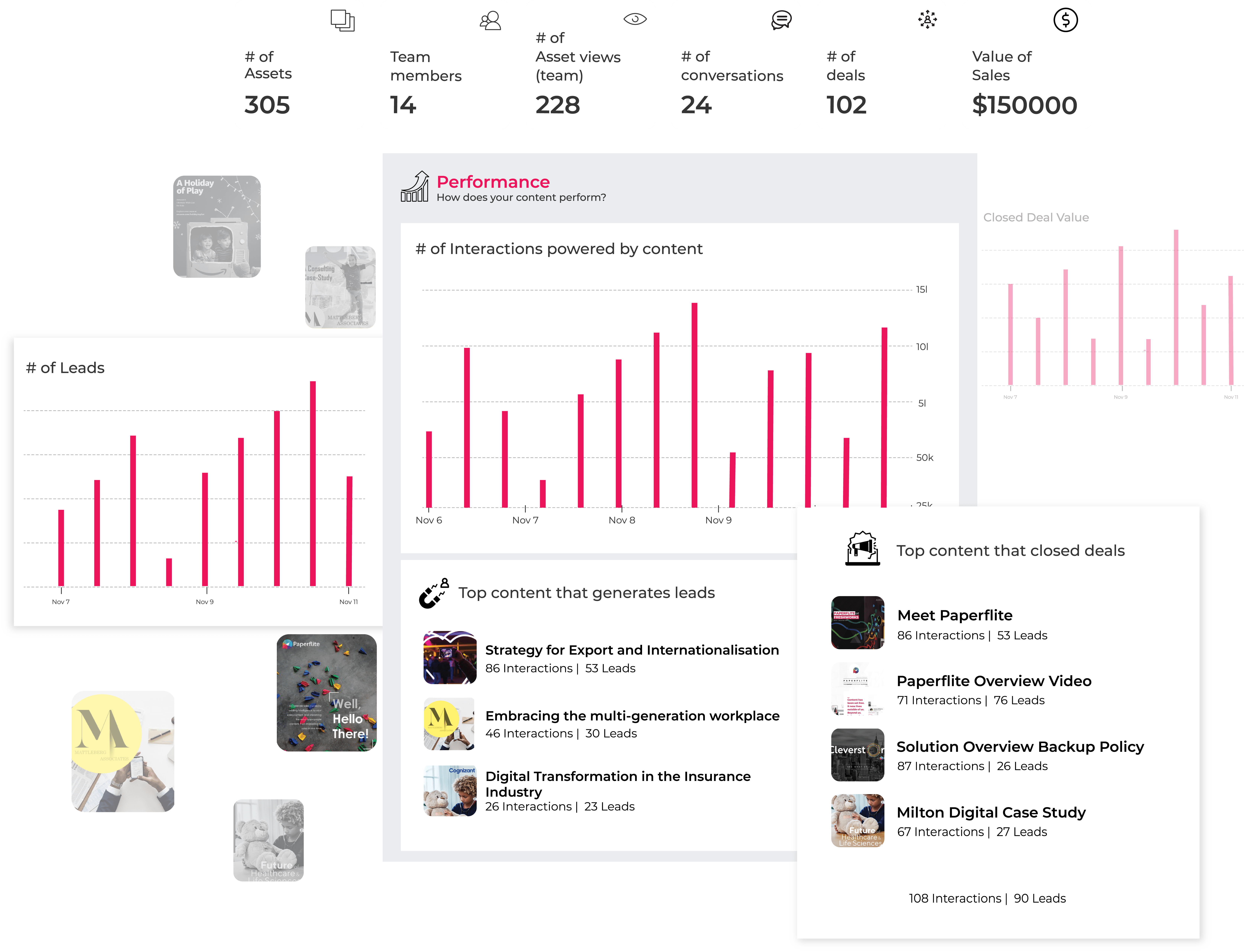
Once you have organized and personalized your content, the next step is to distribute it effectively. A content hub platform should provide easy content distribution features, allowing you to share content with the right audience effortlessly. Additionally, it should offer robust analytics capabilities to track content performance.
Insights such as top shared content, popular content within teams, user engagement, and campaign performance help optimize future content strategies and measure the effectiveness of your content marketing efforts.
A comprehensive content marketing hub empowers businesses to engage their audience, increase brand awareness, drive customer engagement, and boost conversions. By creating compelling content, optimizing user-friendly navigation, leveraging social media, and continuously monitoring performance, businesses can maximize the impact of their content marketing efforts.
After establishing a content marketing hub, organizations should focus on consistently producing high-quality content, analyzing data for optimization, nurturing audience relationships, and adapting strategies based on insights to ensure sustained success in their content marketing initiatives.
